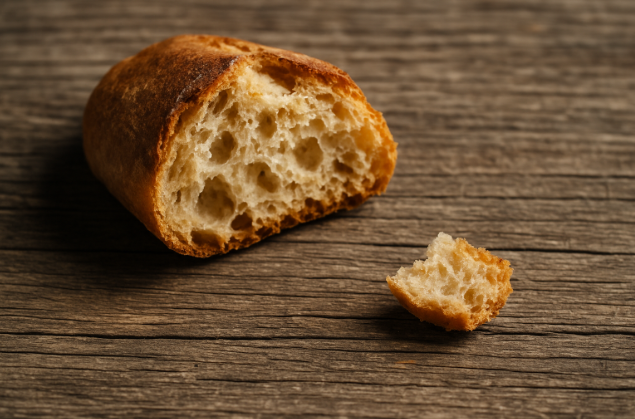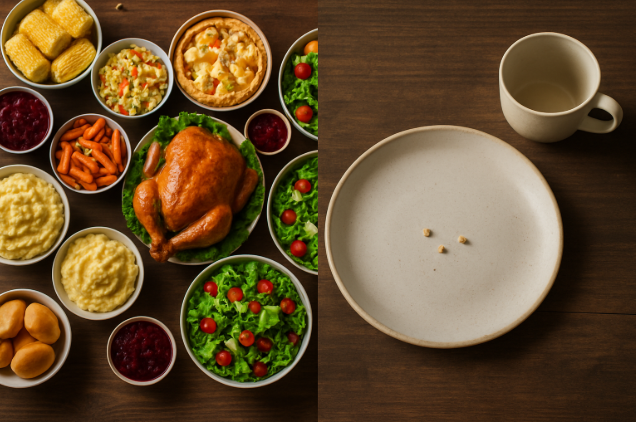This Independence Day, I share a personal reflection about rising above hardship. “More Than Crumbs” is my stand for worth, faith, and freedom amidst lack.

As I sit in reflection, I’m reminded that true freedom isn’t always a political or national event—it’s personal.
Of equal importance, it’s the choice to rise in the face of adversity. To speak life where death looms. To declare, even with tears in your eyes and bills unpaid, “I am still the seed of the Father.”
For the past few weeks, I’ve struggled financially, accepting scattered fill-in shifts as an end-of-life caregiver. Each week, my income has barely amounted to anything.
Agencies offer crumbs—two hours here, three and four hours there—while I juggle grief, purpose, and uncertainty.
But I am not my paycheck. I am not the instability of my schedule. Furthermore, I am not the lack I see today.
I am an heir!
And so, I wrote this poem—not from comfort, but from covenant. It is a declaration of who I am, even when life feels fragile and provision feels fleeting.
Seed of the Father: More Than Crumbs
I am the seed of the Father
Joint heir with Christ the Son
Let me tell you a bit further
Through Him my strifes are won
David declared in the Scriptures
His seed will not beg bread
Sons and daughters across cultures
Should not for lack be dead
So here’s a prime demonstration
My path is filled with woes
God has given consolation
I’m blessed from head to toes
I will not beg or take little
Of this and that, just crumbs
I’m persuaded and won’t settle
Nor make life in the slums
Rise up I will and be counted
As one whose worth defies
Rules of others who are granted
The voice to hush my cries
So there’s my verse and next chapter
A path that lights the way
Filled with substance and much laughter
To share with those astray
©Veron Lee Campbell — July 4, 2025

Poem Analysis Overview | From Scarcity to Spiritual Identity
This poem is a vivid blend of scriptural truth, lived hardship, and unwavering faith. It opens by establishing spiritual identity:
The poet is not merely a worker or a woman in need—she is a joint heir with Christ, a declaration rooted in Romans 8:17.
And if children, then heirs; heirs of God, and joint-heirs with Christ; if so be that we suffer with him, that we may be also glorified together.
The second stanza invokes David’s observation in Psalm 37:25—“I’ve never seen the righteous forsaken nor his seed begging bread.”
This promise becomes a call to justice, a subtle lament that too many of God’s children still face daily need.
I have been young, and now am old; yet have I not seen the righteous forsaken, nor his seed begging bread.
By the third stanza, we feel the tension between real-life struggle and divine consolation. “My path is filled with woes,” she writes—yet still, “I’m blessed from head to toes.”
Here lies the paradox of Christian living: lack on the outside, abundance on the inside.
The pivotal fourth stanza draws a clear boundary: I will not live on crumbs. This is a personal decision against settling. Not just for food or wages, but for identity, dignity, and God-given purpose.
In the fifth stanza, the poet’s voice strengthens. She rises, not only to be seen, but to be counted. She challenges systems—both spoken and unspoken—that silence suffering and overlook value.
Finally, the poem ends in hope and mission. Her next chapter is “filled with substance and much laughter,” but not just for herself—it’s “to share with those astray.” The light she’s found is one she intends to shine outward.
Why This Poem Matters Today
For me, this poem is not just art—it’s survival. Moreover, it’s how I process pain and proclaim truth.
It’s how I make sense of working tirelessly while income remains unstable.
Furthermore, it’s how I reclaim the dignity of caregiving—a profession often undervalued, even though it demands everything from the heart.
And above all, it’s how I remind myself that I am more than my circumstances.
Yes, I may have only made “crumbs” this week.
But I carry promises worth far more.
I am blessed from head to toes.
And I will not settle for crumbs.
Full Analysis | Seed of the Father: More Than Crumbs
Introduction
This heartfelt and declarative poem by Veron Lee Campbell is a spiritual and personal response to a difficult life season. Specifically, it’s one marked by financial instability and inconsistent work as an end-of-life caregiver.
Through poetic verse, the author:
- Reaffirms her divine identity
- Rejects a life of scarcity
- And speaks hope over her present situation.
The poem is both prophetic and autobiographical, drawing on Biblical truths to counter real-life hardships. It’s written not from a place of defeat, but from faith-fueled defiance.
Stanza-by-Stanza Breakdown: 1-3
Stanza 1:
I am the seed of the Father
Joint heir with Christ the Son
Let me tell you a bit further
Through Him my strifes are won
The opening lines establish identity. The poet affirms her spiritual lineage and position in Christ, echoing Romans 8:17 which speaks of being joint heirs with Christ.
This isn’t just theology—it’s personal empowerment. She hints at a deeper narrative (“Let me tell you a bit further”), setting the stage for a testimony in poetic form.
Victory is claimed not by might, but through faith: “Through Him my strifes are won.”
Stanza 2:
David declared in the Scriptures
His seed will not beg bread
Sons and daughters across cultures
Should not for lack be dead
This stanza draws on Psalm 37:25, where David observes that the righteous are never forsaken. The poet connects this truth across generations and cultures, extending its promise universally.
She subtly protests the societal and systemic issues that let so many struggle—especially those who should be walking in the overflow of divine promises.
Stanza 3:
So here’s a prime demonstration
My path is filled with woes
God has given consolation
I’m blessed from head to toes
Here the contrast becomes visible: the reality of hardship versus the reality of spiritual blessing. The poet doesn’t deny her struggles (“My path is filled with woes”) but refuses to be defined by them.
She declares God’s consolation and adopts a posture of complete, embodied blessing—“from head to toes.”
Stanza-by-Stanza Breakdown: 4-6
Stanza 4:
I will not beg or take little
Of this and that, just crumbs
I’m persuaded and won’t settle
Nor make life in the slums
This stanza is the turning point, and possibly the emotional heart of the poem. It directly confronts scarcity. The poet refuses scraps, both literal and metaphorical. Her language—“I will not beg or take little”—is firm.
She positions herself as someone who won’t settle, not in attitude, not in expectation, not in lifestyle. This is both a faith declaration and a call to self-worth.
Stanza 5:
Rise up I will and be counted
As one whose worth defies
Rules of others who are granted
The voice to hush my cries
Here we hear resistance. The poet vows to rise up and be counted, referencing not only her God-given value but her right to be acknowledged.
There’s a subtle indictment here of those who have power (“the voice”) to diminish others’ pain. Yet, the poet proclaims that her worth defies all that.
Stanza 6:
So there’s my verse and next chapter
A path that lights the way
Filled with substance and much laughter
To share with those astray
The final stanza is forward-looking. The poet recognizes this poem itself as a transition, a new chapter. The imagery shifts from struggle to light, joy, and purpose. Even her laughter becomes a gift to share.
The stanza closes with a vision that’s not just personal but missional—she’s lighting the way for others who are lost or discouraged.
Themes Explored | Tone and Style
- Divine Inheritance vs. Earthly Lack
The poet draws strength from her identity in Christ and contrasts it with the reality of financial and vocational instability. Her spiritual perspective redefines her perceived lack. - Faith and Resistance
There’s a holy defiance in this poem. It resists the narrative that caregivers on the lower pay spectrum, must live in poverty. It challenges the system—and even internal voices—that say “take what you get.” - Empowerment Through the Word
Scripture isn’t just referenced—it’s lived. David’s promise, Paul’s theology, and Christ’s victory are all woven into the poet’s modern-day struggle. - Hope for Others
This poem ends not just with personal encouragement, but with a commitment to uplift others. The writer becomes a light-bearer.
Tone and Style
The tone is resolute, reflective, and redemptive. The consistent rhyme scheme gives the poem a steady rhythm, echoing the steady faith that undergirds every line.
The word choice is simple but profound, making it accessible while still deeply meaningful.

Conclusion | More Than Crumbs
“Seed of the Father: More Than Crumbs” is not simply a poem—it is a faith proclamation born of lived experience. It calls for dignity not just in theory, but in the daily bread of work, wages, and worth.
Through it, Veron Lee Campbell shows us how poetry can speak truth to power, and faith to famine. It’s a message that many in caregiving, ministry, or overlooked roles will deeply resonate with.
2 Corinthians 1:3–4 KJV says:
Blessed be God, even the Father of our Lord Jesus Christ, the Father of mercies, and the God of all comfort;
Who comforteth us in all our tribulation, that we may be able to comfort them which are in any trouble, by the comfort wherewith we ourselves are comforted of God.
A Word to You, Reader, From My Heart
If you’re in a season of “crumbs”—in your finances, your calling, your confidence—I pray this reminds you:
You are the seed of the Father. You are seen and heard. And you are worth more than the world sometimes offers.
Your path may be filled with woes—but it can also be lined with light.
This poem is my offering.
May it be your reminder.
I’d love to hear from you. What does freedom mean to you in this season of your life? Share in the comments below.
With hope and purpose,
Veron | Business Owner | The Way 4Word Enterprises
This is profound. The poem speaks clearly about the daily struggles of most persons.
It also gives hope and courage to go on and move forward and upward in our goal to freedom from crumbs.
Thank you so much, Lavern, for your encouragement and for seeing the heart behind “More Than Crumbs.” I’m deeply touched that the poem resonated with you.
Yes — it came from a place of both struggle and hope. While we can all face seasons of scarcity or feeling unseen, I believe we’re called to rise above “crumbs” — not just accepting less than our worth, but pressing into our God-given identity and calling.
Your words remind me that we don’t author these pieces just for ourselves, but for hearts like yours who need affirmation, courage, and a companion on the climb.
Thank you again for your kindness and insight.